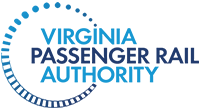NEWS RELEASE – November 20, 2024
Virginia’s TRV initiative could provide nearly $7 billion economic boost
RICHMOND — Today the Weldon Cooper Center for Public Service at the University of Virginia published the Economic and Social Impact of the Virginia Passenger Rail Authority’s (VPRA) Transforming Rail in Virginia (TRV) initiative. The study takes a deep dive into the benefits of expanding passenger rail service in the Commonwealth and how the state’s investment in this transportation alternative will provide not only an economic boost to the state but will make generational changes in the way Virginians travel.
TRV is the Commonwealth’s forward-looking plan that calls for moving Virginians by using an existing rail corridor and building new infrastructure, eventually separating freight and passenger rail services, and improving the on-time performance of both. Once complete, VPRA will fund a total of 13 daily Amtrak roundtrips, up from the current eight, along four corridors between Washington, DC and Roanoke, Newport News, Norfolk, and Richmond.
The Transforming Rail in Virginia: Economic and Social Impacts study estimates that spending nearly $4.7 billion on TRV’s infrastructure projects will result in:
- The creation of 33,688 jobs;
- generating $2.6 billion in labor income;
- with $4 billion in value-added;
- and $6.7 billion in statewide economic output.
“The results of the Transforming Rail in Virginia study reveal the importance of advancing a transportation plan that includes rail as an alternative to driving,” said DJ Stadtler, Executive Director of VPRA. “The economic benefits are clear, but including the social impacts reveal how rail can significantly benefit communities, safety, and the environment.”
The Transforming Rail study also mentions that the impacts of TRV are not limited to economic development. The transportation improvements will influence future property values and land use decisions, as well as positively impact accessibility, and social wellbeing. The report also shines light on ways TRV can promote rail, removing barriers to its use by offering more service to more locations thus creating regular users from those who previously had not considered rail as a viable alternative. Secondary impacts include the diversion of traffic from the automobile to passenger rail resulting in reduced road congestion, lower vehicle emissions, and improved safety. TRV also has the opportunity to enhance the quality of life of Virginians by expanding access to employment centers, educational institutions, and recreational areas as well as promoting tourism throughout the state.
Read the report here.
About Virginia Passenger Rail Authority
The Virginia Passenger Rail Authority was established in 2020 to promote, sustain, and expand the availability of passenger and commuter rail service in the Commonwealth. Through its Transforming Rail in Virginia initiative, VPRA is acquiring railroad right-of-way and building infrastructure to expand passenger rail throughout Virginia. VPRA is also committed to delivering and expanding its state-supported Amtrak Virginia passenger rail service. The Commonwealth of Virginia first launched state-supported service in 2009 with one roundtrip between Washington, DC and Lynchburg, VA. Since that time, Virginia’s state-supported passenger rail service has grown to include eight roundtrips daily with stops at 17 stations along four corridors. For more information, please visit vapassengerrailauthority.org. Follow us on social media: Facebook @VAPassengerRail, X @vapassengerrail, LinkedIn virginia-passenger-rail-authority, and YouTube @virginiapassengerrailauthority.
About University of Virginia’s
Weldon Cooper Center for Public Service
The University of Virginia’s Weldon Cooper Center for Public Service supports a well-informed citizenry by providing nonpartisan, reliable research and leadership training to individuals and entities that serve the public good. The Cooper Center’s staff are experts in in public management, demography, economics and public finance, policy, political science, mediation, leadership and organizational development, survey research, and more. For more information, please visit http://www.coopercenter.org/.
###

